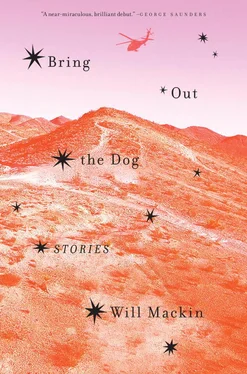Will Mackin - Bring Out the Dog
Здесь есть возможность читать онлайн «Will Mackin - Bring Out the Dog» весь текст электронной книги совершенно бесплатно (целиком полную версию без сокращений). В некоторых случаях можно слушать аудио, скачать через торрент в формате fb2 и присутствует краткое содержание. Город: New York, Год выпуска: 2018, ISBN: 2018, Издательство: Random House Publishing Group, Жанр: prose_military, на английском языке. Описание произведения, (предисловие) а так же отзывы посетителей доступны на портале библиотеки ЛибКат.
- Название:Bring Out the Dog
- Автор:
- Издательство:Random House Publishing Group
- Жанр:
- Год:2018
- Город:New York
- ISBN:978-0-812-99564-0
- Рейтинг книги:5 / 5. Голосов: 1
-
Избранное:Добавить в избранное
- Отзывы:
-
Ваша оценка:
- 100
- 1
- 2
- 3
- 4
- 5
Bring Out the Dog: краткое содержание, описание и аннотация
Предлагаем к чтению аннотацию, описание, краткое содержание или предисловие (зависит от того, что написал сам автор книги «Bring Out the Dog»). Если вы не нашли необходимую информацию о книге — напишите в комментариях, мы постараемся отыскать её.
Bring Out the Dog — читать онлайн бесплатно полную книгу (весь текст) целиком
Ниже представлен текст книги, разбитый по страницам. Система сохранения места последней прочитанной страницы, позволяет с удобством читать онлайн бесплатно книгу «Bring Out the Dog», без необходимости каждый раз заново искать на чём Вы остановились. Поставьте закладку, и сможете в любой момент перейти на страницу, на которой закончили чтение.
Интервал:
Закладка:
“It wasn’t your fault,” he said.
TIME PASSED MYSTERIOUSLY inside the clouds. Unlike when the orbiting drones could see the ground, and a haystack or a cow would spin around on the flatscreens like a second hand, we sat watching the spinning clouds without knowing for how long. Meanwhile, the UHF clicked like something radioactive. This was the night after Konduz, or the night after our return to Konduz. We had no intelligence, still. Sitting cross-legged on the floor, I tried peace on for size. I felt proud that I’d fought, or something like proud, but also glad it was over. Hal asked for suggestions, and Joe raised his hand.
Hal said, “You don’t need to raise your hand.”
“I had a teacher, in primary school, who used to hit my knuckles with a ruler,” Joe said. “I would like to pay him a visit.”
“I had a teacher like that,” Hal said.
“Me, too,” Digger said.
The rest of us nodded, remembering.
Joe had last seen his teacher at his old school, in the town of Ghawas, in Wardak Province, in 1979. Joe had been eleven at the time. The teacher had seemed ancient to Joe back then. In hindsight, however, Joe figured that his teacher had been no older than thirty. Which meant that there was a good chance, in 2009, that the teacher was still alive. He’d lived in a cabin near a forest, Joe remembered, though he couldn’t say exactly where. Joe assured us, though, that he could find the cabin if we could find his old school.
We’d never had reason to patrol through Ghawas; therefore, we had no maps of tactical value. Digger, who always planned our routes, turned to the computer that contained the satellite imagery. Our imagery of Ghawas was both stale and irregular. Half of it dated from the winter of 2003, the other half from the spring of 2005. The school, Joe said, was a stone building on the eastern bank of a river. It had stood just north of a bend in the river that was shaped like a question mark.
Hal, Joe, and I stood behind Digger as he searched Ghawas for a river with a question mark. He found it in an image that had been captured by a satellite on a May afternoon in 2005. Digger zoomed in, and we saw the river’s banks overflowing with snowmelt. Sunlight sparkled in the eddies. Reeds grew from stagnant pools. Digger scrolled northbound in search of the school. The imagery changed to winter, 2003. The river narrowed and turned dark as slate. A hundred yards north of the question mark, on the river’s eastern bank, we discovered a stone foundation poking from the ice. Joe thought it was too small to be the ruins of his old school, but then he realized it had to be.
From the school’s foundation, Joe guided Digger along the path the teacher had walked on his way home. It ran north along the river for a snowy mile; then the imagery switched back to spring, and the path cut east into a warm field of grass. As a student, Joe used to follow the teacher at a safe distance across this field. Crouching in the tall grass, he would fantasize about leaping out and knocking his teacher down. More than revenge, though, he’d wanted to study his teacher. He’d kept his eyes on his desk in class all day, hoping to stay out of trouble. Following the teacher home was Joe’s chance to finally see the man. Joe described his teacher as tall and prematurely gaunt. He said that the teacher had worn a heavy robe during his walks home in winter. He remembered butterflies rising in the teacher’s wake when he crossed the grassy field in spring.
“Keep going,” Joe said to Digger.
Digger continued scrolling across the sunlit field to a snow-covered forest. The image of that forest had been captured on a January evening in 2003. Shadows cast by the tall, bare trees looked like minute hands, all showing ten past the hour. Halfway across the forest, the satellite imagery ran out. The computer screen turned black.
“He lives on the other side of that forest,” Joe said.
“How far?” Hal asked.
Joe touched a spot on the dark computer screen. “Here.”
The four of us looked at that spot.
“I’m thinking callout,” Digger said to Hal.
Callouts were best in unknown situations. Like, we didn’t know whether or not the cabin existed or, if it did, how big it might be. We didn’t know who, other than the teacher, might be hiding inside or how prepared they might be to mount a defense. To mitigate the risks posed by these unknowns, a callout would proceed in stages. The 47s would drop us off outside the cabin, beyond small-arms range. If we took fire from the cabin, we’d keep our distance, and I’d call in an air strike. If not, we’d run toward the cabin, then surround it on two sides. Digger would throw a flash bang through a window. Light would tear through the cabin. Bangs would echo in the night. After all was dark and quiet, Joe would read a statement into a bullhorn, informing the startled occupants that we were coalition forces, there to protect the rights of the Afghan people.
“Yeah,” Hal said. “Let’s go with a callout. But no flash bang. And Joe, I want you to say something different tonight.”
Hal chose a line from the end of a song by Pink Floyd called “Another Brick in the Wall (Part 2).” The song opens with the lyric “We don’t need no education” and goes on to denounce teachers as repressive and cynical. The song ends in a riot. As the students tear down their school, a teacher’s voice can be heard above the din. He’s hollering admonishments, such as “Wrong! Do it again!” and “Stand still, laddie!” Hal chose one such rebuke for Joe to shout through the bullhorn. Joe practiced it on the helicopter ride out to Ghawas.
“‘If you don’t eat your meat, you can’t have any pudding…’”
“No,” Hal interrupted. “You need more fear in your voice.”
Joe and Digger sat on one side of the helicopter, Hal and I on the other. Night parted around us and mended in our wake.
“I don’t think ‘fear’ is the right word,” I said.
“It’s Joe’s teacher,” Digger said. “Let him say it however he wants.”
“The teacher in the song is staring down an angry mob,” Hal said. “He can’t just say the words.”
“I think my teacher is more crazy than afraid,” Joe said.
“All right,” Hal said. “Let’s hear it again.”
The windows in the MH-47 were made of Plexiglas. They were shaped like mixing bowls. Looking through them, I saw things on the outside as either close and blurry, or far away and blurry. There was a sweet spot in the lens, however, where something would emerge perfectly magnified. Thus, when we banked over the highway that ran between Kandahar and Kabul, I saw a bleary-eyed trucker behind the wheel. When we floated over the mountains into Wardak, I saw a waterfall cascading into a crystalline lake. And when we turned above the ruins of Joe’s old school, I imagined the school as it had once been—stone walls, slate roof, and leaded glass windows.
We cut across the field of tall grass and sped over the woods at treetop level. The rotors beat louder as we pulled into a hover. We touched down on either side of the teacher’s cabin, without taking fire. The 47s lifted off behind us as we ran. Rotor wash shoved me through clumps of dry grass and over the tops of warm, surfacing boulders. Archie, carrying Yaz’s massive gun, ran ahead of me, while Joe, carrying his red bullhorn, ran behind. The teacher’s cabin was made of logs. Grass grew on the roof. A curl of smoke rose from its stone chimney. A neatly stacked woodpile stood behind it. Empty rabbit traps leaned against a wall. We formed lines on two sides of the cabin. Taking position next to Hal, I saw myself reflected in a dark blue window.
We stood, still and quiet, outside the teacher’s cabin as the 47s descended into a valley. Soon enough, their noise became a memory; then that memory faded. A cold wind rustled the grass. Our breath rose in thick clouds. I imagined the teacher lying awake in bed, wondering if he’d only dreamed of helicopters landing outside.
Читать дальшеИнтервал:
Закладка:
Похожие книги на «Bring Out the Dog»
Представляем Вашему вниманию похожие книги на «Bring Out the Dog» списком для выбора. Мы отобрали схожую по названию и смыслу литературу в надежде предоставить читателям больше вариантов отыскать новые, интересные, ещё непрочитанные произведения.
Обсуждение, отзывы о книге «Bring Out the Dog» и просто собственные мнения читателей. Оставьте ваши комментарии, напишите, что Вы думаете о произведении, его смысле или главных героях. Укажите что конкретно понравилось, а что нет, и почему Вы так считаете.












